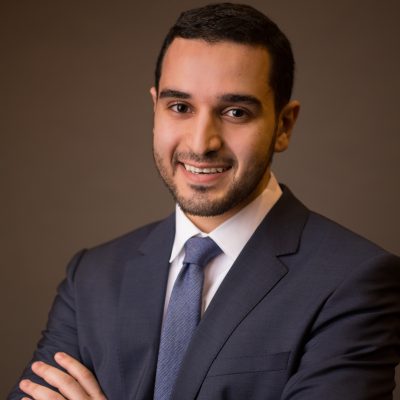Alumnus Spotlight: Mohammed AlAmer, Ph.D. ’20

June 15, 2020
Mohammed AlAmer, Ph.D. ’20, is a recent alumnus of the chemical engineering program at Cornell. After earning his bachelor’s degree at McGill University and doctorate at Cornell, he will be joining Saudi Aramco’s Research and Development Center as a research scientist in Dhahran, Saudi Arabia.
What is your area of research and why is it important?
My research focuses on the synthesis and fabrication of multiple carbon frameworks based on graphene. Graphene has received a tremendous amount of attention lately due to its extraordinary properties, including its high electrical and thermal conductivities. It is 200 times stronger than steel while being considered the thinnest material on earth due to its two-dimensional nature. Thousands of researchers are incorporating graphene in different fields. It has also paved the way for more two-dimensional materials to be discovered and investigated.
What are the larger implications of this research?
This research will help us synthesize and fabricate high-quality graphene in a cost-effective and scalable manner using a Taylor-Couette reactor setup. Getting a better understanding of how fluid dynamics within the reactor affect the yield and quality of graphene sheets can allow us to tailor and control the fabrication operating conditions to produce graphene sheets with specific properties.
What inspired you to choose this field of study?
During my undergraduate studies, I was deeply interested in experimental research and I started working in the Porous Materials Engineering and Analysis Lab at McGill. After graduating, I joined Saudi Aramco as a Research and Development Engineer for three years and I was involved in reactor design and chemical reaction kinetics. Shortly after joining Cornell as a Ph.D. student, I was introduced to the Taylor-Couette reactor setup. I found it extremely interesting to study the interaction of fluid mechanics, reactor design, and material science, which combined my favorite chemical engineering subjects.
What was the process like of adapting your defense to an online platform?
When I first booked my defense date, I knew that it would be during Ramadan, which is the Muslim holy month of fasting. I was excited about the prospect of defending while fasting, as it would be an exciting challenge. After the campus shutdown and the transition to online platforms, I was devastated that I wouldn’t have the opportunity to defend in-person, as this is the moment that every doctoral candidate builds up to for five or six years. Given that all classes and meetings have transitioned to online platforms, I had the opportunity to experiment with the new platform and adapt to it.
How did it feel to pivot to an ultimately successful online defense?
To be completely honest, I was extremely worried for many reasons. I wasn’t sure if I would be heard clearly by the audience. However, during my practice talk with my research group, my Ph.D. advisor and colleagues gave me helpful feedback to ensure my voice level is suitable for the defense. Given that I had numerous flow visualization videos and animations, I was worried that there would be online lags and glitches. However, my research group assured me that the videos and animations were displayed in a perfect manner. Additionally, given that I have a one-year-old baby, I wasn’t sure about the background noise level during my defense. Thankfully, my lovely wife kept our son happy during the day and ensured that his nap time coincided with the defense.
What are your hobbies or interests outside of your research or scholarship?
My wife and I really enjoy hiking and the outdoors, and we love traveling and discovering new places. Also, I continuously look for opportunities to develop new skills by taking classes outside my field of work. I spent the last two years of my graduate studies learning the French language. Additionally, serving as an organizing chair in Expanding Your Horizons was an extremely rewarding experience, which is an annual conference that invites middle-school girls to learn about science and technology. Finally, I founded the Saudi Club at Cornell to celebrate my rich Saudi culture by organizing gatherings and arranging fully-funded trips to Saudi Arabia for Cornell students.
Why did you choose Cornell to pursue your degree?
I chose Cornell mainly because of the exciting research being conducted on campus. Cornell is world-renowned for the high caliber in scientific excellence, mainly because of the faculty members. Additionally, Cornell provides the perfect collaborative environment to cultivate and grow technical innovation, which is a passion of mine. I was also amazed by the numerous learning opportunities offered at Cornell, which allowed me to develop new skills and discover exciting learning areas.
If you could go back in time to the beginning of your graduate career, what advice would you give yourself?
I would advise myself to be patient, stay active, and enjoy every moment. Also, take full advantage of being on Cornell’s campus by looking for ways to challenge yourself and to develop new skillsets, as this may be your last chance being a full-time student. Finally, embrace sleep a little bit more before having a kid in graduate school!
Now that you have graduated, what are your plans?
During my time at Cornell, I was funded entirely by Saudi Aramco. After graduation, I will join Saudi Aramco’s Research and Development Center as a research scientist in Dhahran, Saudi Arabia. Along with world-class scientists and engineers, we will develop cutting-edge technologies to contribute to Saudi Aramco’s ongoing transformational and strategical goals and global stance within the energy and chemicals industry.
